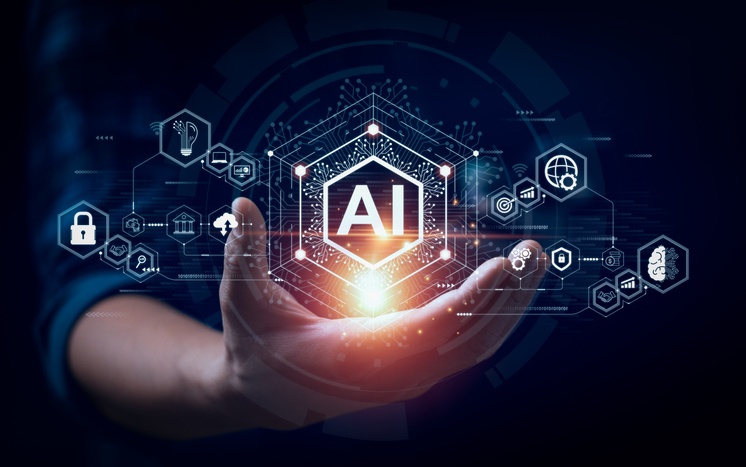
By Dr. John Wyatt
The tech world is abuzz with the extraordinary power of what is now called ‘generative AI’, mind-bogglingly complex algorithms that can create original text, audio, images and video, on the basis of patterns learned from vast amounts of training data.
ChatGPT, a text generating program, was made available to the general public in December 2022 and is said to be the fastest-growing internet service ever, reaching 100 million users two months after its launch. The company that created the program, OpenAI, has landed a $10-billion deal with Microsoft, which plans to integrate ChatGPT technology into its Office software and the Bing search engine.
Not to be outdone, Google is fast-tracking the rollout of its own chatbot, LaMDA. Hoping to remain at the forefront of generative artificial intelligence, other competing tech companies will soon release programs which are said to be even more sophisticated and human-like than ChatGPT.
We’re rapidly moving into a world where we may never know whether an editorial, sermon, student essay, scientific research paper, or even a book was created by a human being, a mindless AI system, or some combination of the two. AIs are not only becoming alarmingly good at creating original text, but the program can also generate images, documents, architectural plans, music and computer code. You name it, AI can probably do it.
Progress or problematic?
The implications for educators, academics, authors, journalists and creative artists are impossible to predict. Some experts are calling this new advancement as important a breakthrough as the internet itself. Yet, there’s no doubt that there are serious problems and dangers looming ahead. If AI can write an essay or plan a menu for you, could it be used to create powerful ‘prophetic’ sermons or even new interpretations of biblical truth? Christian leaders and teachers who are tempted to use these remarkable tools must be particularly cautious.
While ChatGPT and similar programs can efficiently churn out information in a confident and fluent manner, some of its content has turned out to be incorrect or highly misleading. The programs can effectively generate fabrications, conspiracy theories and heresies. And it is not only factual inaccuracies, but the more subtle and egregious manipulation of ideas and content, that is particularly dangerous. The algorithm has been trained on vast amounts of text and other data spread across the internet, and much of it contains hidden biases, deliberate misinformation and overt evil.
At the same time, commercial companies are racing to develop ways to manipulate the output of the new AI programs to maximize their own profits. Yet, the precise mechanisms by which ChatGPT chose those particular words in response to a specific prompt are impossible to understand. Even the engineers who designed and wrote the code behind the program can’t fully explain how the algorithmic mathematics worked to choose that specific text. So then, how confident can a person be placing their name and authority on words of which the origin and nature are basically unknown?
Authenticity matters
The debate about how Christians should respond to these powerful advancements is only just beginning. As we navigate these new systems, we can’t be naïve and unquestioning in adopting fascinating new technologies without thought and spiritual discernment.
However attractive the output may be, the Christian perspective is that authenticity, character, honesty and truthfulness matter to God. This most certainly applies to what Christian leaders write and speak from a public platform. Throughout the Bible, a distinction is made between the person who maintains an outward appearance of righteousness and those who live with integrity “from the heart,” the hidden core of our being that only God sees and knows.
So perhaps those of us who want to uphold Biblical values should make a public commitment that we will never use AI-generated material without full transparency, clearly identifying what is our own thoughts and words, and what is artificial.
What does it mean to be human in a world that is increasingly dominated by nearly-human machines?
Mankind has always tried to understand itself by comparison with the most sophisticated technology of the age. It has even become become commonplace to suggest that human beings are “computers made of flesh.” But in reality we are so much more than that.
The Bible teaches that each one of us was created as a unique reflection and physical image of God. We were known and loved even before the foundation of the world. We were called into existence and formed in our mother’s womb, woven into a network of human relationships, called into intimate communion with our Creator. We’re given free will and are accountable for our choices and actions.
The advent of ChatGPT is an opportunity to highlight the Divine differences between impersonal human-constructed mechanisms and unique human persons, wonderfully created in the image of our Creator. Yes, the technology is extraordinary, but to compare a human person to an AI created by human engineers is a futile exercise.
Advancing AI technology will continue to transform our world, our workplaces and our daily lives, and it may well bring remarkable improvements in efficiency and productivity. But as Christian believers, we have a special calling to safeguard and celebrate the importance of face-to-face, human-to-human relationships, and honest, truthful human speech. As we strive to serve a Lord who reminds us that “…on the day of judgment people will give account for every careless word they speak” (Matthew 12:36), it is surely vital that we continue to strive for authenticity and truthfulness in all we say and do.
Dr. John Wyatt is a Christian physician, author, speaker and research scientist, and the host of the “Matters of Life and Death” podcast. He is actively engaged in addressing new ethical, philosophical and theological challenges caused by advances in medical science and technology, as recently discussed on Premier Unbelievable? with Justin Brierley. For more information, visit johnwyatt.com.


